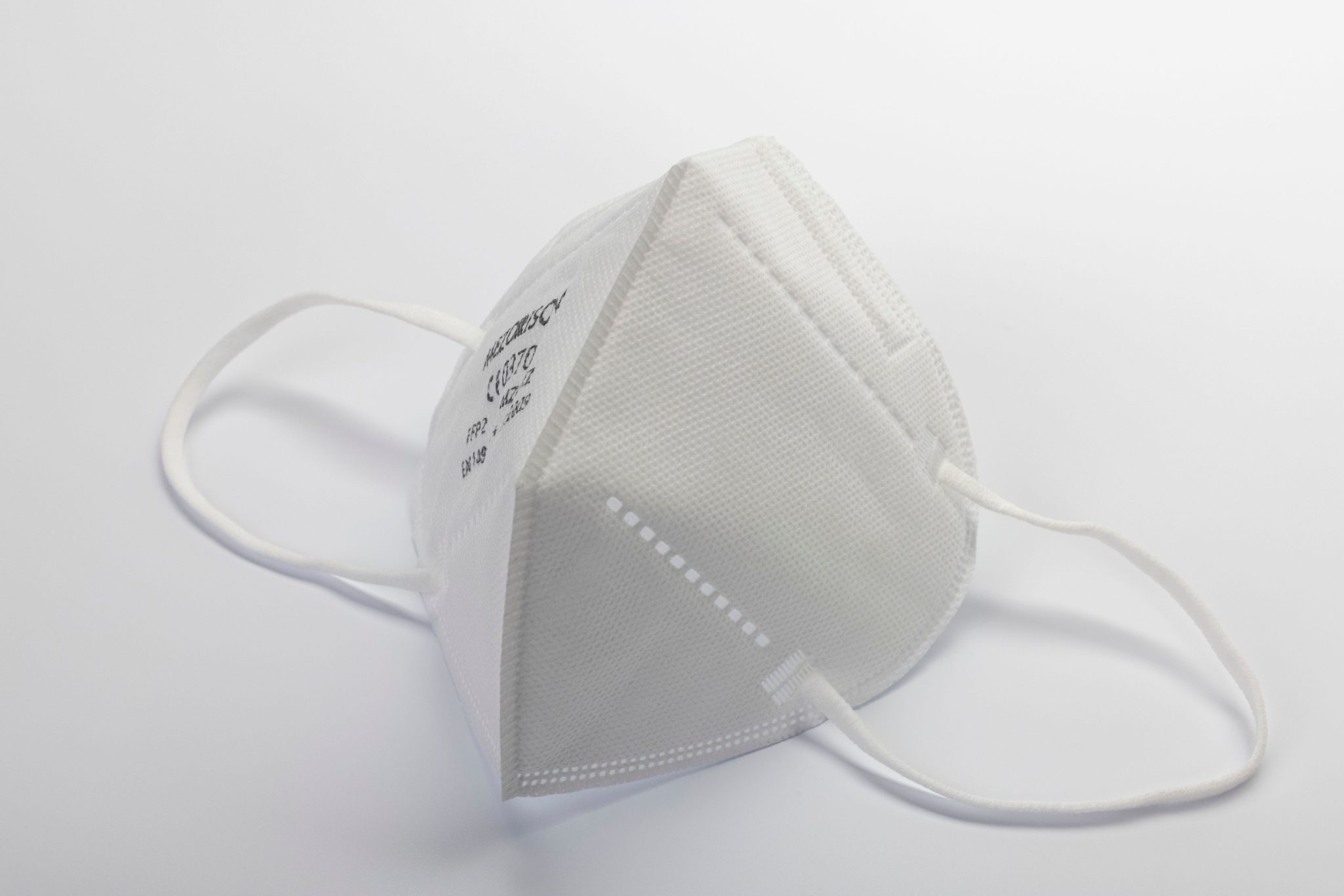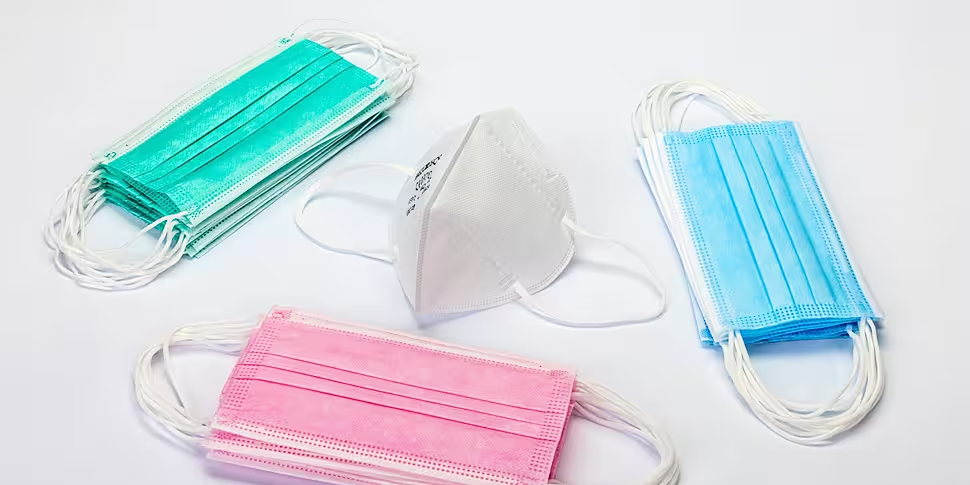With COVID-19 still spreading widely within the community due to the Omicron variant, there has been a renewed focus on the types of masks being used by the general public.
There have been growing calls from some public health experts and politicians for high-grade FFP2 medical or respirator masks to be used more widely.
Public health officials are changing their stance on the issue as well: NPHET now says the higher-grade face masks may offer more protection to people at greater risk of getting the virus.
NPHET has recommended that higher quality masks should be considered by anyone who's a confirmed case, a household contact or visiting a vulnerable person, and that anybody who wants to wear a higher-grade mask should do so.
Despite that, officials have so far stopped short of recommending them to everyone for everyday use.
Here's what you need to know about FFP2 masks, and where the experts stand on the issue.
What are FFP2 masks?
FFP2, KN95 and N95 masks are three widely-used grades of respirator-style face masks. We’ll focus on FFP2 masks in this article.
These are masks specifically designed to filter airborne particles, containing multiple layers of material separated by filter layers.
Some masks do offer plastic valves to allow more air out (potentially helping the wearer's breathing), although this as a result offers much less protection to other people near the wearer.
There are also higher-grade FFP3 masks, which offer greater protection again than FFP2.
In contrast, the more commonly used masks - such as the distinctive, disposable ‘blue’ surgical masks or reusable cloth masks - typically offer fewer layers of protection.
There are also, of course, different quality masks - some will offer flimsy, single layer protection, while others will offer multiple layers of fabric and therefore better protection.
 An FFP2 mask
An FFP2 maskFit is also an extremely important factor with all types of face-covering - a loose mask will offer significantly less protection than one that properly fits across your nose and mouth.
Some countries - including the US - have recommended ‘double masking’ to the general public: a disposable mask underneath and a reusable cloth mask on top.
The effectiveness of all these masks can vary wildly, but generally it’s estimated that a properly-fitted FFP2 maks can filter out 94-95% of particles.
In contrast, a typical cloth mask (which would not be considered PPE in a medical environment) might offer 50% or less protection and filter out far fewer smaller particles. A loose-fitting surgical mask, meanwhile, will likely see more particles and droplets 'leak out' through the edges.
Many experts have suggested loose or thin masks are likely better than nothing (especially for protecting those around you), but will not offer anywhere near the same level of protection as a proper, well-fitting alternative.
NPHET’s stance
In a letter to Government last week, NPHET detailed their current stance - a stance that has changed significantly since the arrival of Omicron.
They said: “Medical grade and respirator masks, if properly worn, offer greater protection than cloth masks.
“Anyone who wishes to wear a medical grade or respirator mask instead of a cloth mask should do so, so long as whichever mask they choose is well-fitting and worn properly.”
They suggest vulnerable groups and older people should wear medical-grade masks in the likes of crowded indoor and outdoor settings, including public transport and retail.
Confirmed cases, symptomatic people and household close contacts should also “ideally” wear a respirator or medical-grade mask, NPHET says.
The latest advice came just a month after NPHET suggested such masks should not be supported at a population-wide level.
However, despite the updated advice, they do still say the respirator and medical-grade masks should be “prioritised for use by healthcare workers and those in healthcare settings”.
They also say it’s vital to continue communicating the importance of all types of masks, as well as the fresh advice around medical-grade ones.
Other views
A number of countries have already moved to make FFP2 and high-quality masks more widely used.
In Austria, for example, FFP2 masks are mandatory in indoor spaces such as restaurants (when not at your table) and some crowded outdoor spaces.
Some politicians and experts have been calling for FFP2 masks to be used more widely across Irish society - with People Before Profit TD Paul Murphy saying they should be freely available for the likes of teachers, bus drivers and other workers.
Kingston Mills, professor of experimental immunology at Trinity College, says there are indeed a lot of poor-quality masks being used in society.
Speaking on The Pat Kenny Show, he said: “Single-cloth masks that are re-used ten times or more without being washed… they’re not pointless, but certainly not as good as the medical masks.
“The HSE is handing out masks when you get tested… these are treble-ply masks designed to trap the virus if you sneeze or cough.
“Good medical masks rather than single-ply cloth masks are what I’d be advocating for all of the public.”
However, Professor Mills said it’s still “debatable” about whether the general public should be using higher-grade FFP2 masks.
He said there's the concern that supplies could run out if everyone suddenly rushes out to buy respiratory-style masks, and that the masks are specifically designed for hospital settings.
He noted that while such higher-grade masks likely aren’t needed when simply out doing the groceries, but could indeed be beneficial in settings such as a plane or other crowded indoor settings.
Are FFP2 masks widely available in Ireland?
Reusable cloth masks or disposable ‘surgical’ ones remain by far the most widely available masks - they're most likely what you'll find in the average shop or supermarket.
However, some pharmacies and medical suppliers are selling FFP2 masks to the general public, although even some of those retailers are reporting low stock at the moment due to increased demand.
If you're searching online, you're best buying from Irish and EU retailers to ensure you're getting masks up to the certified standards.
In all cases, 'FFP2' should be labelled clearly on the box or package.









